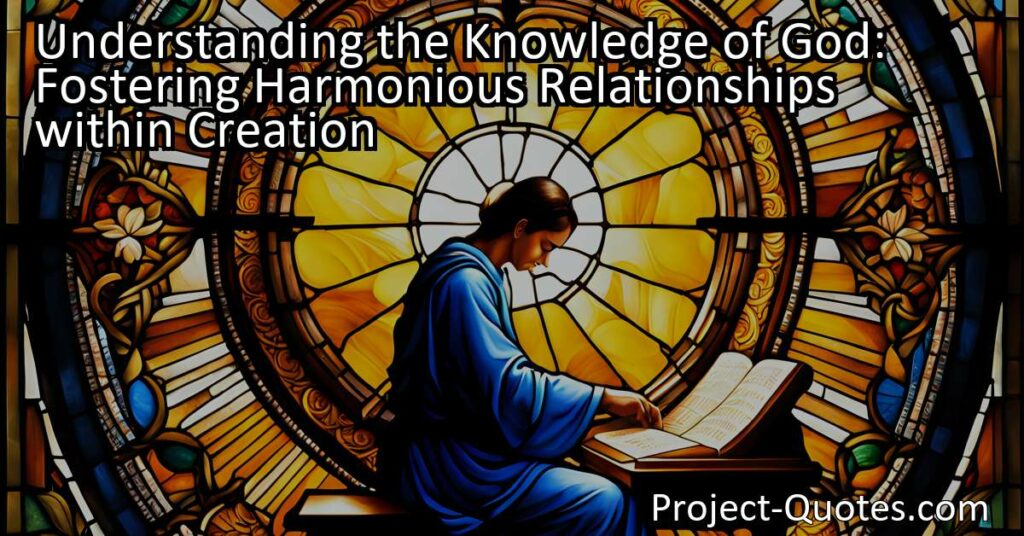The knowledge of God is the cause of things. For the knowledge of God is to all creatures what the knowledge of the artificer is to things made by his art.
Thomas Aquinas
Understanding the Knowledge of God: Fostering Harmonious Relationships within Creation Delve into the profound impact of God’s knowledge on all of creation. Just as an artist understands their artwork, God’s knowledge extends to every aspect of His creation, providing unity, purpose, and moral direction. By seeking and aligning ourselves with this wisdom, we can cultivate harmonious relationships within the world.
Table of Contents
- 1 The knowledge of God is the cause of things. For the knowledge of God is to all creatures what the knowledge of the artificer is to things made by his art.
- 2 Thomas Aquinas
- 3 Meaning of Quote – The knowledge of God is the cause of things. For the knowledge of God is to all creatures what the knowledge of the artificer is to things made by his art.
- 4 Freely Shareable Quote Image
- 5 Related
Meaning of Quote – The knowledge of God is the cause of things. For the knowledge of God is to all creatures what the knowledge of the artificer is to things made by his art.
Understanding the Knowledge of God: A Fundamental Force in All Creation
Introduction:
Throughout history, humans have sought answers to the mysteries of the universe and the underlying forces that govern it. One such force that has captured the minds of countless individuals is the knowledge of God. As the renowned theologian and philosopher Thomas Aquinas once stated, “The knowledge of God is the cause of things. For the knowledge of God is to all creatures the knowledge of the artificer to things made by his art.” In this profound quote, Aquinas draws a parallel between God’s knowledge and the understanding an artist possesses about their creations. To comprehend the true significance of this statement, we must examine the nature of God’s knowledge, its effect on creatures, and how it shapes the world around us.
1. The Source of All Knowledge:
Aquinas posits that the knowledge of God serves as the ultimate foundation upon which everything else is built. However, it is essential to understand the concept of God’s knowledge in the context of the quote. Aquinas refers not only to God’s transcendental wisdom but also to His absolute understanding of the inherent nature of all things. This knowledge does not merely refer to factual information but encompasses a deeper understanding of the underlying principles that govern the universe.
2. The Artificer Analogy:
To illustrate his point, Aquinas likens God’s knowledge to that of an artificer, or artisan. Just as an artist possesses a comprehensive understanding of their creations, God’s knowledge extends to every aspect of His creation. When an artist crafts a masterpiece, they do so with a clear understanding of the materials, techniques, and desired outcome. Similarly, God possesses an intimate awareness of every detail of His creation and the purpose it serves.
3. Understanding God’s Knowledge:
One may wonder how we, as mortal beings, can comprehend or access God’s knowledge. Aquinas acknowledges that while we cannot fully grasp the magnitude of God’s wisdom, we can strive to discern His intentions and divine design. By observing and contemplating the intricacies of nature, studying sacred texts, and engaging in spiritual practices, humanity gains insight into God’s knowledge and the underlying truths it holds.
4. Universal Harmony:
The knowledge of God is not limited to a few select individuals or specific beings; rather, it is a force that envelops all creatures. Just as an artist’s knowledge extends to every aspect and detail of their creation, God’s knowledge permeates the entire universe. When all creatures align themselves with the divine plan, a harmonious balance is achieved. This harmony manifests in the intricate ecosystems, celestial symphony, and the interconnectedness of all life.
5. The Impact of Divine Knowledge:
The knowledge of God serves as a guiding force for all living beings. It provides purpose, direction, and a moral compass. By recognizing and aligning ourselves with this knowledge, we can lead more fulfilling lives and contribute to the betterment of society. Ancient religious texts, revered by billions, provide guidelines for living in accordance with God’s wisdom. These principles not only foster personal growth but also promote compassion, justice, and unity among individuals, communities, and nations.
6. God’s Knowledge and Human Free Will:
While God’s knowledge fundamentally shapes the world, it is essential to address the question of human free will. How does our ability to make choices align with God’s all-encompassing knowledge? Aquinas suggests that our free will operates within the scope of God’s greater plan. Our decisions have consequences, some deviating from the divine intent, yet God’s infinite knowledge accommodates these variations and channels them back towards the ultimate purpose.
Conclusion:
In essence, Thomas Aquinas’s quote regarding the knowledge of God emphasizes its profound impact on all of creation. Just as an artist possesses an in-depth understanding of their artwork, God’s knowledge extends to every facet of His creation. This knowledge serves as a guiding force and allows for unity, purpose, and moral direction in the world. While we, as finite beings, cannot fully comprehend the vastness of God’s wisdom, it is in the pursuit and recognition of this knowledge that we find our connection to the divine. By understanding and aligning ourselves with God’s wisdom, we gain insight into the purpose for which we were created, promoting personal growth and fostering harmonious relationships within the world.
I hope this quote inspired image brings you hope and peace. Share it with someone who needs it today!


